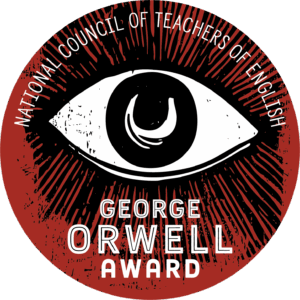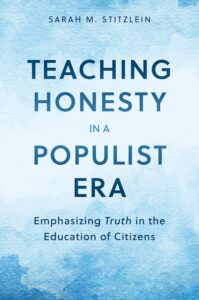George Orwell Award Previous Recipients
2024
Jessica Lander
Making Americans: Stories of Historic Struggles, New Ideas, and Inspiration in Immigrant Education
In Making Americans: Stories of Historic Struggles, New Ideas, and Inspiration in Immigrant Education, Jessica Lander asserts that merely teaching immigrant-origin students language is insufficient for their success in academics and careers. Lander underscores the significance of nurturing the whole person and provides eight elements to assist students in reaching their full potential. She shares narratives illustrating this framework in action and encourages prioritizing relationships and community over individual achievement. Additionally, Lander examines public language and policies that have influenced the discourse of immigrant education in the United States. By presenting historical events, contemporary political moments, and powerful student stories, she underscores the importance of immigrant education for the country’s future. The book has received the George Orwell Award for its transparent, honest, and informative examination of immigrant education. It is a valuable resource for a broad audience, including educators, policymakers, and the general public.
2023
Kisha Porcher & Shamaine Bertrand
Black Gaze Podcast
Through Black language, Dr. Kisha Porcher and Dr. Shamaine Bertrand bring the Black body to light and speak on its lived experiences in public discourse in the Black Gaze podcast. Exploring topics from fatphobia to rest, the podcast amplifies how the Black body, especially the Black woman body, works hard in a country structured around racism. Black Gaze’s focus on loving your body and protecting yourself first explicitly speaks back to harmful implicit capitalist logics. Every aspect of the podcast, from its topics, linguistic practices, and accessibility, meet the goal of the Orwell Award as an outstanding contribution to the analysis of public discourse. Furthermore, the Black Gaze podcast also exemplifies NCTE’s Statement on Anti-Racism to Support Teaching and Learning, demanding that we actively work toward “counteracting racism and other forms of bigotry in teaching materials, methods, and programs for the teaching and learning of English and the language arts.”
2022
David Chrisinger
Public Policy Writing That Matters, second edition
The Orwell Award celebrates honesty and clarity in public language, and David Chrisinger’s book, Public Policy Writing That Matters, highlights the importance of public policy that is thoughtfully, concisely, and clearly written. Chrisinger walks the reader through important considerations of writing public policy, from clarifying one’s thinking to constructing coherent paragraphs and concise sentences. Centering his writing advice on public policy that is both human-centered and audience-focused, he emphasizes the art of storytelling in public policy—noting that policy affects communities and individuals, not abstract constructions of government. While Chrisinger’s book is written with an eye towards those who write public policy, his advice is applicable toward any writer, including those we teach in the classroom.
2021
Kristin Kobes Du Mez
Jesus and John Wayne: How White Evangelicals Corrupted a Faith and Fractured a Nation
Kristin Kobes Du Mez’s book Jesus and John Wayne unveils a rich and fascinating account of White, evangelical Christianity’s influence over social and political systems in the United States throughout the past seventy-five years. This powerful read helps to illuminate the roots of current social and political divides in America by revealing the intricate relationships between faith, celebrity, and political power. Jesus and John Wayne chronicles how discourse in evangelical Christian media has linked both political figures and popular cultural figures, such as John Wayne, Billy Graham, Oliver North, Mel Gibson, and multiple presidents, with White, hyper-masculine power and militarization since the 1950s. Well-researched and wide in scope, Du Mez’s book offers a timely and necessary reexamination of possibly one of the country’s most influential cultures.
2020
April Baker-Bell
Linguistic Justice: Black Language, Literacy, Identity, and Pedagogy
Dr. April Baker-Bell’s book, Linguistic Justice: Black Language, Literacy, Identity, and Pedagogy, is a powerful call to both critically analyze and criticize language instruction and its corresponding ideologies in the English Language Arts classroom. Introducing Anti-Black Linguistic Racism, which “describes the linguistic violence, persecution, dehumanization, and marginalization that Black Language-speakers experience in schools and in everyday life” (p. 11), Dr. Baker-Bell calls for the celebration of Black students and Black Language in all spaces, focusing on the rich literacy practices and experiences of Black youth. Her book, timely and important, highlights the need to re-envision language education so that we can end racism and linguistic violence in classrooms.
2019
Michael P. Lynch
Know-It-All-Society: Truth and Arrogance in Political Culture
The Orwell Award emphasizes the importance of honesty and clarity in public language, and Michael Patrick Lynch’s book Know-It-All Society: Truth and Arrogance in Political Culture reminds us that honesty and clarity is more than just listening to speakers behind a podium; honesty and clarity in public language also refers to how we interact every day with those around us. Lynch accessibly explores aspects around and within public language, including the ideas of how our convictions affect both our worldview and the resulting discourse, and how intellectual arrogance and intellectual humility shape our interactions with others. Relying of the frameworks of philosophers from Dewey to Montaigne to Socrates, Lynch offers us a path to consider for how we speak with and listen to others in our 21st century political landscape.
2018
Katie Watson
Scarlet A: The Ethics, Law, and Politics of Ordinary Abortion
The NCTE Public Language Awards Committee values the accessibility, linguistic analysis, and sensitivity to language expressed in The Scarlet A by Katie Watson. The book is an exploration of the abortion debate and how language shapes and blocks our discussion of what is essentially a health topic. Watson’s analysis brings depth and nuance to an issue that has become polarizing, often considered too extreme to discuss with candor. The Committee agreed it is a book we will eagerly share to re-start conversations on this important topic. The Scarlet A is a book that tears down language barriers and achieves the goals and the spirit of the Orwell Award.
2017
Richard Sobel
Citizenship as Foundation of Rights: Meaning for America
This book embodies the spirit of Orwell and impacts the far-reaching, universal issue of immigration. Citizenship is likely a word that is frequently used but rarely understood. Richard Sobel’s rather sobering and methodical book serves as a social critique and impetus for social justice. While the cases cited and the context of this work are largely focused on the United States, its implications and relevance reach beyond our borders and address a global issue.
2016
David Greenberg
In his book Republic of Spin: An Inside History of the American Presidency, Greenberg presents a remarkable insight into the politics of language with respect to the U.S. presidents and presidential hopefuls, along with their respective teams of media experts. Greenberg tenaciously explores how presidents have exercised media management and spin to their own advantage. Each president is analyzed in context to the historical and social trends and the media of the time period, allowing readers to draw broader connections between the possible motivations underlying a president’s use of media coverage and the specific standards of that time period. This text is an example of the importance of recognizing spin and supports a key mission of NCTE: critical media literacy. Given this year’s presidential debates and the vast amount of spin during the election, the timing is especially appropriate for Republic of Spin to receive the Orwell Award.
Please click here to view the full list of previous recipients of the George Orwell Award.



